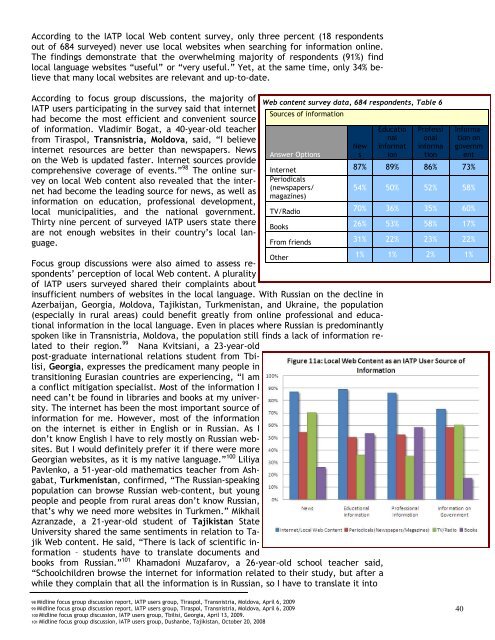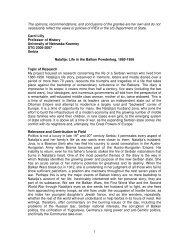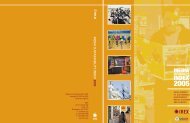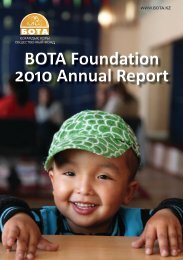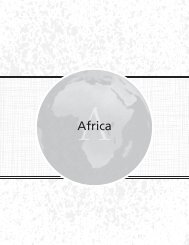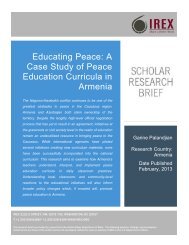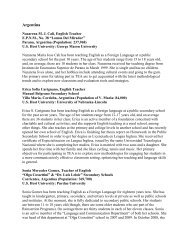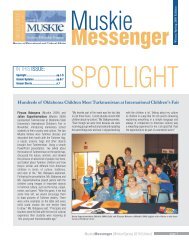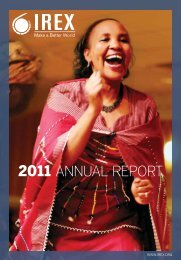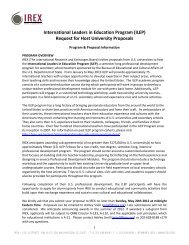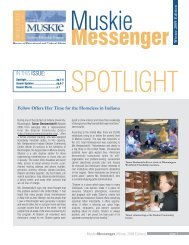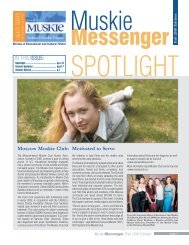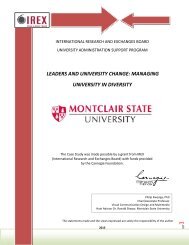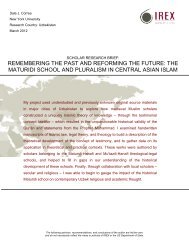IATP Monitoring and Evaluation Report - IREX
IATP Monitoring and Evaluation Report - IREX
IATP Monitoring and Evaluation Report - IREX
You also want an ePaper? Increase the reach of your titles
YUMPU automatically turns print PDFs into web optimized ePapers that Google loves.
According to the <strong>IATP</strong> local Web content survey, only three percent (18 respondents<br />
out of 684 surveyed) never use local websites when searching for information online.<br />
The findings demonstrate that the overwhelming majority of respondents (91%) find<br />
local language websites “useful” or “very useful.” Yet, at the same time, only 34% believe<br />
that many local websites are relevant <strong>and</strong> up-to-date.<br />
According to focus group discussions, the majority of<br />
<strong>IATP</strong> users participating in the survey said that internet<br />
had become the most efficient <strong>and</strong> convenient source<br />
of information. Vladimir Bogat, a 40-year-old teacher<br />
from Tiraspol, Transnistria, Moldova, said, “I believe<br />
internet resources are better than newspapers. News<br />
on the Web is updated faster. Internet sources provide<br />
comprehensive coverage of events.” 98 The online survey<br />
on local Web content also revealed that the internet<br />
had become the leading source for news, as well as<br />
information on education, professional development,<br />
local municipalities, <strong>and</strong> the national government.<br />
Thirty nine percent of surveyed <strong>IATP</strong> users state there<br />
are not enough websites in their country’s local language.<br />
Web content survey data, 684 respondents, Table 6<br />
Sources of information<br />
Answer Options<br />
Other 1% 1% 2% 1%<br />
Focus group discussions were also aimed to assess respondents’<br />
perception of local Web content. A plurality<br />
of <strong>IATP</strong> users surveyed shared their complaints about<br />
insufficient numbers of websites in the local language. With Russian on the decline in<br />
Azerbaijan, Georgia, Moldova, Tajikistan, Turkmenistan, <strong>and</strong> Ukraine, the population<br />
(especially in rural areas) could benefit greatly from online professional <strong>and</strong> educational<br />
information in the local language. Even in places where Russian is predominantly<br />
spoken like in Transnistria, Moldova, the population still finds a lack of information related<br />
to their region. 99 Nana Kvitsiani, a 23-year-old<br />
post-graduate international relations student from Tbilisi,<br />
Georgia, expresses the predicament many people in<br />
transitioning Eurasian countries are experiencing, “I am<br />
a conflict mitigation specialist. Most of the information I<br />
need can’t be found in libraries <strong>and</strong> books at my university.<br />
The internet has been the most important source of<br />
information for me. However, most of the information<br />
on the internet is either in English or in Russian. As I<br />
don’t know English I have to rely mostly on Russian websites.<br />
But I would definitely prefer it if there were more<br />
Georgian websites, as it is my native language.” 100 Liliya<br />
Pavlenko, a 51-year-old mathematics teacher from Ashgabat,<br />
Turkmenistan, confirmed, “The Russian-speaking<br />
population can browse Russian web-content, but young<br />
people <strong>and</strong> people from rural areas don’t know Russian,<br />
that’s why we need more websites in Turkmen.” Mikhail<br />
Azranzade, a 21-year-old student of Tajikistan State<br />
University shared the same sentiments in relation to Tajik<br />
Web content. He said, “There is lack of scientific information<br />
– students have to translate documents <strong>and</strong><br />
books from Russian.” 101 Khamadoni Muzafarov, a 26-year-old school teacher said,<br />
“Schoolchildren browse the internet for information related to their study, but after a<br />
while they complain that all the information is in Russian, so I have to translate it into<br />
New<br />
s<br />
Educatio<br />
nal<br />
informat<br />
ion<br />
Professi<br />
onal<br />
informa<br />
tion<br />
Information<br />
on<br />
governm<br />
ent<br />
Internet 87% 89% 86% 73%<br />
Periodicals<br />
(newspapers/<br />
magazines)<br />
54% 50% 52% 58%<br />
TV/Radio 70% 36% 35% 60%<br />
Books 26% 53% 58% 17%<br />
From friends 31% 22% 23% 22%<br />
98 Midline focus group discussion report, <strong>IATP</strong> users group, Tiraspol, Transnistria, Moldova, April 6, 2009<br />
99 Midline focus group discussion report, <strong>IATP</strong> users group, Tiraspol, Transnistria, Moldova, April 6, 2009<br />
100 Midline focus group discussion, <strong>IATP</strong> users group, Tbilisi, Georgia, April 13, 2009.<br />
101 Midline focus group discussion, <strong>IATP</strong> users group, Dushanbe, Tajikistan, October 20, 2008<br />
40


